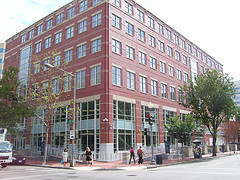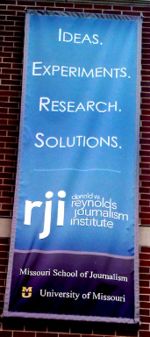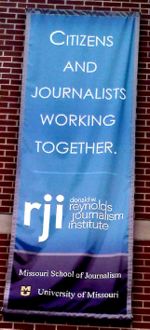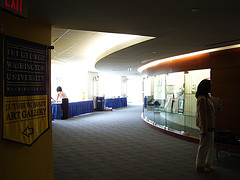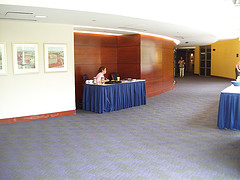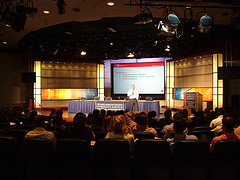Difference between revisions of "Gwu-program"
(→April 27, 2009 / 10 a.m.-4 p.m. / The George Washington University) |
(→VIEW PROGRAM VIDEOS) |
||
| (120 intermediate revisions by 11 users not shown) | |||
| Line 1: | Line 1: | ||
| − | + | [[Image:Gwu-smpa.jpg|frame|left|[GWU SMPA Building]]] | |
| − | |||
| − | |||
| − | |||
| − | |||
| − | |||
| + | =AN URGENT DISCUSSION:<BR><BR>"From Gatekeeper to Information Valet:<br><br>Work Plans for Sustaining Journalism"= | ||
| + | ===Wed., May 27, 2009 / 10 a.m.-4 p.m. / The George Washington University / Jack Morton Auditorium / 805 21st Street NW / Washington D.C.=== | ||
| + | <hr> | ||
| + | ==[http://www.newshare.com/wiki/index.php/Jta-event VIEW ARCHIVED PROGRAM VIDEOS]== | ||
| + | [[Image:Rji-ideas.jpg|thumb|150px|right|[http://rji.missouri.edu/image-library/stories/new-building/index.php RJI PICTURED]]] | ||
| + | [[Image:Rji-working.jpg|thumb|150px|right|[http://rji.missouri.edu/vision-and-mission/index.php THE RJI VISION]]] | ||
| + | <hr><h3>[https://extweb.missouri.edu/NewWebReg/Login.aspx?uid=3&pid=112389 REGISTER NOW ($55/full day; $30 half day)] / [http://newshare.com/wiki/index.php/Gwu-program VIEW PROGRAM] / [http://newshare.com/wiki/index.php/Gwu-participants WHO'S PARTICIPATING?] | ||
| + | /[http://tinyurl.com/cymuke VIEW/PRINT TWO-PAGE FLYER]</h3><hr> | ||
| − | + | ==Tentative Program and Schedule== | |
| − | === | + | (Times and presenters subject to change / check this page for last-minute updates) |
| + | |||
| + | ===''9 a.m. -- Pre-event coffee/danish and discussion''=== | ||
<ul> | <ul> | ||
| − | * | + | * Register and connect early with other participants/attendees and presenters over coffee and danish from 9 a.m. '''(LOCATION: Atrium area on floor above Jack Morton Auditorium -- enter SMPA front doors)''' |
| + | </ul> | ||
| − | + | ===10 a.m. -- Welcome by Michael Shanahan, GWU School of Media & Public Affairs=== | |
| − | solutions | + | ===10:05 a.m. -- The Reynolds Journalism Institute: Ideas, research, experiments, solutions=== |
| + | <ul> | ||
| + | *With the intention of broadly collaborating with other institutions and enterprises, the [http://www.rjionline.org Donald W. Reynolds Journalism Institute] (RJI) at the Missouri School of Journalism is pursuing ideas, research, experiments and solutions that help sustain and lead journalism into the 21st century. Dean Mills, Pam Johnson and Bill Densmore offer a short briefing on RJI, the RJI fellows program, the Information Valet Project and the "do-tank" approach to discovering, assessing, integrating and deploying multiple revenue solutions for the news industry across multiple platforms. </ul> | ||
| − | + | ===10:15 a.m. -- Discussion/Q&A: The Strategic Landscape for Sustaining News === | |
| + | <ul> | ||
| + | *RJI commissioned [http://www.betterbuydesign.com/resources.html Steve Mott,] a former journalist and noted payments-industry analyst and consultant to comprehensively study the best research on mobile, print and web marketplaces to paint a picture from a non-news-industry perspective of strategies for sustaining journalism. Also part of the discussion: Walter Isaacson, president/CEO of The Aspen Institute; Merrill Brown, senior strategist, Journalism Online LLC; Cynthia Typaldos, founder and president of [http://www.kachingle.com/ Kachingle], Matt Mankins of [http://newshare.com/wiki/index.php/Gwu-participants-mankins In-a-Moon,] and Scott Karp, CEO and co-founder of [http://www.newshare.com/wiki/index.php/Jta-participants-karp Publish2]. This panel may challenge conventional wisdom, setting a tone for the rest of the day. Come with tough questions.</ul> | ||
| + | [[Image:Gwu-lobby.jpg|frame|left|[SMPA break-out space]]] | ||
| − | === | + | ===11:15 a.m. -- 'Can News Media Survive the Internet Age?' -- The FTC perspective=== |
<ul> | <ul> | ||
| − | + | What is the role of regulators in the news-industry transition considering issues like privacy, advertising, ownership, antitrust, copyright and broadband access? [http://innovationforum.gmu.edu/bios/desanti.php Susan S. DeSanti,] who has just returned as director of policy planning for the Federal Trade Commission, explains the agency's recent decision to hold a series of workshops, [http://www.ftc.gov/opa/2009/05/newspapers.shtm starting Sept. 15]. </ul> | |
| − | |||
| − | |||
| − | |||
| − | |||
| − | ===11 a.m. -- | + | ===11:30 a.m. -- Briefing: A work in progress: Building the InfoValet Economy=== |
<ul> | <ul> | ||
| − | *Moving from mass markets to mass customization, from gatekeeper to "information valet" is an urgent task for traditional print and broadcast news organizations. Reynolds Fellow Bill Densmore, | + | *Moving from mass markets to mass customization, from gatekeeper to "information valet" is an urgent task for traditional print and broadcast news organizations. Reynolds Fellow [http://rji.missouri.edu/projects/info-valet/index.php Bill Densmore,] InfoCard's [http://www.parity.com/team.html#paul Paul Trevithick], CircLabs' [http://www.newshare.com/wiki/index.php/Blueprint-participants-vanderclute Jeff Vander Clute] and [http://www.newshare.com/wiki/index.php/Blueprint-participants-langeveld Martin Langeveld] present present a work-in-progress concept solution addressing user privacy, interest-based advertising, customized news and multi-site subscription networks -- including a proposed launch timetable. What's missing? A Q&A follows. </ul> |
| − | ===11:45 a.m. -- The Wall of ideas: | + | ===11:45 a.m. -- The Wall of ideas: Tapping the wisdom of our crowd === |
<ul> | <ul> | ||
| − | *The Jack Morton Auditorium and adjacent foyer offers the space during lunch for participants to caucus and agree on critical topics to propose for discussion during one round of concurrent, group-called breakout sessions in the afternoon. We'll describe how the convening process works before serving a box lunch. But first, we'll | + | *The Jack Morton Auditorium and adjacent foyer offers the space during lunch for participants to caucus and agree on critical topics to propose for discussion during one round of concurrent, group-called breakout sessions in the afternoon. We'll describe how the convening process works before serving a box lunch. But first, we'll ask everyone in the room: What are you working on?</ul> |
| − | ===12: | + | ===12:00-12:45 p.m. -- BOX LUNCH -- A chance to network ideas, and post breakouts === |
<ul> | <ul> | ||
*Post discussion topics on the News Wall, and negotiate with fellow convenors to combine or morph related topics.</ul> | *Post discussion topics on the News Wall, and negotiate with fellow convenors to combine or morph related topics.</ul> | ||
| − | === | + | ===12:45 p.m. -- The Value of privacy: Findings from a new national study -- Prof. Lee Wilkins=== |
<ul> | <ul> | ||
*As the public becomes more aware of how its time and attention is "monetized," what are citizens willing to trade for the privacy, and how is it valued? Missouri School of Journalism Prof. Lee Wilkins reveals results from a new national study completed in in early April. </ul> | *As the public becomes more aware of how its time and attention is "monetized," what are citizens willing to trade for the privacy, and how is it valued? Missouri School of Journalism Prof. Lee Wilkins reveals results from a new national study completed in in early April. </ul> | ||
| − | ===1: | + | ===1:15 p.m. -- "GAME ON! Aggregators vs. Newspapers and the Future of Online News"=== |
<ul> | <ul> | ||
| − | *Missouri School of Journalism | + | *Missouri School of Journalism grad student Emily Sussman will discuss past, present and future experiments with paywalls around news and information. Will the massive popularity of aggregation websites keep news and information (mostly) free to consumers, or will an emerging newspaper consortium usher in the second (and perhaps, successful) generation of paid content? The presentation will explore these questions in light of the web's post-scarcity economy. A vigorous Q&A will follow. (Followups can be emailed to ews8tb@gmail.com) '''</ul> |
| − | === | + | ===1:45 p.m. -- QUICK-SHARE BRIEFINGS: More options for saving journalism or newspapers=== |
| − | Briefings are | + | Briefings are seven-minute updates to share knowledge on key projects, ideas and technologies ongoing concurrently. Depending on interest, leaders will lead breakout sessions immediately after this segment. |
<ul> | <ul> | ||
| − | *Charles "Chuck" Lewis, American University, founder Center for Public Integrity -- "Update on formation and funding of non-profit national and regional investigative journalism initiatives." | + | *'''Charles "Chuck" Lewis,''' director, Investigative Reporting Workshop at American University; Joe Bergantino, founder, New England Center for Investigative Reporting; Ann Peters, [http://www.mediagiraffe.org/wiki/index.php/Gwu-pulitzer Pulitzer Center on Crisis Reporting,] and Bill Buzenberg of the Center for Public Integrity-- "Update on formation and funding of non-profit national and regional investigative journalism initiatives." |
| − | *James "Jay" Hamilton, Duke University, author ''All the News That's Fit to Sell'' -- "Concepts for trading of privacy as an economic good." | + | *'''James "Jay" Hamilton,''' Duke University, author ''All the News That's Fit to Sell'' -- "Concepts for trading of privacy as an economic good." |
| + | *'''Curtis Gans,''' [http://newshare.com/wiki/index.php/Gwu-participants-gans "DISCUSSION: Saving the Newspaper at the Center of Civic Literacy."] | ||
| + | *[http://albertsun.info/about/ Sun, Albert,], student, University of Pennsylvania, Philadelphia, Pa. / [http://albertsun.info/2009/03/price-discriminate/ "The Economics of Charging for Online Content"] | ||
</ul> | </ul> | ||
| + | [[Image:Gwu-floortwo.jpg|frame|right|[lobby / breakout space]]] | ||
| + | |||
| + | [[Image:Gwu-morton.jpg|frame|left|[Jack Morton Auditorium in use]]] | ||
| + | <hr><h3>[http://newshare.com/wiki/index.php/Jta BACK TO HOME PAGE]</H3><HR> | ||
===2:30 p.m. -- Discussion and snack break -- preparing for breakouts === | ===2:30 p.m. -- Discussion and snack break -- preparing for breakouts === | ||
<ul> | <ul> | ||
| − | * | + | *Whew! Ten briefings in four hours: It's time to connect the dots, assess options and get ready for a flight of breakout sessions.</ul> |
| − | === 2:45 p.m -- Self-identified convenors call their | + | === 2:45 p.m -- Self-identified convenors call their 5-7 breakouts=== |
<ul> | <ul> | ||
| − | *Breakouts disperse within Jack Morton, the atrium and other designated spaces. The goal: | + | *Breakouts disperse within Jack Morton, the atrium and other designated spaces. The goal: Formulate recommendations and ideas for action for the Innovation Engine at RJI and the general journalism community. Return with three ideas and at least one proposed action step. </ul> |
| − | |||
=== 3:30 p.m. -- What we've learned / Next steps=== | === 3:30 p.m. -- What we've learned / Next steps=== | ||
| Line 67: | Line 79: | ||
*Our breakout session scribes return and present -- A fast, faciliated "what have we learned" and "next steps" session. (Bill Densmore) | *Our breakout session scribes return and present -- A fast, faciliated "what have we learned" and "next steps" session. (Bill Densmore) | ||
*Joining the Journalism Trust initiative</ul> | *Joining the Journalism Trust initiative</ul> | ||
| − | < | + | <br><hr>[http://newshare.com/wiki/index.php/Jta RETURN TO HOME PAGE] |
| − | For | + | <h3>[https://extweb.missouri.edu/NewWebReg/Login.aspx?uid=3&pid=112389 REGISTER NOW ($55/full day; $30 half day)]</h3><hr> |
| + | ====Lodging reservations==== | ||
| + | |||
| + | For lodging, you may book a room at the special rate of $189/night, plus tax, at the university-owned [http://www.gwuinn.com/ George Washington University Inn,] 824 New Hampshire Ave., NW, Washington, DC 20037. This "Reynolds Journalism Institute" rate is only available up request by telephoning the GWU Inn reservation desk directly at (202) 337-6620. The Inn offers complimentary Internet Access wire or wireless. Its lobby-located Notti Bianche restaurant is open for breakfast, lunch and dinner. (A box lunch on Wednesday, May 27, is included in the symposium schedule and registration fee). | ||
| − | |||
For more information [mailto:densmorew@rjionline.org email] Bill Densmore, 2008-2009 Reynolds Fellow, or call 573-882-9812. | For more information [mailto:densmorew@rjionline.org email] Bill Densmore, 2008-2009 Reynolds Fellow, or call 573-882-9812. | ||
| + | |||
| + | <hr> | ||
| + | <big>"We need many news organizations to keep our country strong. We need to help each other. We need to <b>partner,</b> we need to <b>experiment</b> and we need to accept and agree that we will continue, we will not accept failure and we need to keep trying and <b>trying different models</b> until we get it right."</big> <LI> Vivian Schiller, CEO of National Public Radio, March 30, 2009, at the [http://www.newsvision.org NewsVision Conference.]<br> | ||
| + | <P> | ||
| + | <big>In a March 16 Time Magazine story about the Project on Excellence in Journalism's 2009 "State of the News Media," report, M.J. Stephey wrote: " . . . (I)f solutions aren't obvious, the report's overall message is: <b>Will the future leaders of journalism please stand up?"</b></big> | ||
Latest revision as of 13:12, 15 April 2012
Contents
- 1 AN URGENT DISCUSSION:"From Gatekeeper to Information Valet:Work Plans for Sustaining Journalism"
- 1.1 Wed., May 27, 2009 / 10 a.m.-4 p.m. / The George Washington University / Jack Morton Auditorium / 805 21st Street NW / Washington D.C.
- 1.2 VIEW ARCHIVED PROGRAM VIDEOS
- 1.3 Tentative Program and Schedule
- 1.3.1 9 a.m. -- Pre-event coffee/danish and discussion
- 1.3.2 10 a.m. -- Welcome by Michael Shanahan, GWU School of Media & Public Affairs
- 1.3.3 10:05 a.m. -- The Reynolds Journalism Institute: Ideas, research, experiments, solutions
- 1.3.4 10:15 a.m. -- Discussion/Q&A: The Strategic Landscape for Sustaining News
- 1.3.5 11:15 a.m. -- 'Can News Media Survive the Internet Age?' -- The FTC perspective
- 1.3.6 11:30 a.m. -- Briefing: A work in progress: Building the InfoValet Economy
- 1.3.7 11:45 a.m. -- The Wall of ideas: Tapping the wisdom of our crowd
- 1.3.8 12:00-12:45 p.m. -- BOX LUNCH -- A chance to network ideas, and post breakouts
- 1.3.9 12:45 p.m. -- The Value of privacy: Findings from a new national study -- Prof. Lee Wilkins
- 1.3.10 1:15 p.m. -- "GAME ON! Aggregators vs. Newspapers and the Future of Online News"
- 1.3.11 1:45 p.m. -- QUICK-SHARE BRIEFINGS: More options for saving journalism or newspapers
- 1.3.12 BACK TO HOME PAGE
- 1.3.13 2:30 p.m. -- Discussion and snack break -- preparing for breakouts
- 1.3.14 2:45 p.m -- Self-identified convenors call their 5-7 breakouts
- 1.3.15 3:30 p.m. -- What we've learned / Next steps
- 1.3.16 REGISTER NOW ($55/full day; $30 half day)
AN URGENT DISCUSSION:
"From Gatekeeper to Information Valet:
Work Plans for Sustaining Journalism"
Wed., May 27, 2009 / 10 a.m.-4 p.m. / The George Washington University / Jack Morton Auditorium / 805 21st Street NW / Washington D.C.
VIEW ARCHIVED PROGRAM VIDEOS
REGISTER NOW ($55/full day; $30 half day) / VIEW PROGRAM / WHO'S PARTICIPATING? /VIEW/PRINT TWO-PAGE FLYER
Tentative Program and Schedule
(Times and presenters subject to change / check this page for last-minute updates)
9 a.m. -- Pre-event coffee/danish and discussion
- Register and connect early with other participants/attendees and presenters over coffee and danish from 9 a.m. (LOCATION: Atrium area on floor above Jack Morton Auditorium -- enter SMPA front doors)
10 a.m. -- Welcome by Michael Shanahan, GWU School of Media & Public Affairs
10:05 a.m. -- The Reynolds Journalism Institute: Ideas, research, experiments, solutions
- With the intention of broadly collaborating with other institutions and enterprises, the Donald W. Reynolds Journalism Institute (RJI) at the Missouri School of Journalism is pursuing ideas, research, experiments and solutions that help sustain and lead journalism into the 21st century. Dean Mills, Pam Johnson and Bill Densmore offer a short briefing on RJI, the RJI fellows program, the Information Valet Project and the "do-tank" approach to discovering, assessing, integrating and deploying multiple revenue solutions for the news industry across multiple platforms.
10:15 a.m. -- Discussion/Q&A: The Strategic Landscape for Sustaining News
- RJI commissioned Steve Mott, a former journalist and noted payments-industry analyst and consultant to comprehensively study the best research on mobile, print and web marketplaces to paint a picture from a non-news-industry perspective of strategies for sustaining journalism. Also part of the discussion: Walter Isaacson, president/CEO of The Aspen Institute; Merrill Brown, senior strategist, Journalism Online LLC; Cynthia Typaldos, founder and president of Kachingle, Matt Mankins of In-a-Moon, and Scott Karp, CEO and co-founder of Publish2. This panel may challenge conventional wisdom, setting a tone for the rest of the day. Come with tough questions.
11:15 a.m. -- 'Can News Media Survive the Internet Age?' -- The FTC perspective
-
What is the role of regulators in the news-industry transition considering issues like privacy, advertising, ownership, antitrust, copyright and broadband access? Susan S. DeSanti, who has just returned as director of policy planning for the Federal Trade Commission, explains the agency's recent decision to hold a series of workshops, starting Sept. 15.
11:30 a.m. -- Briefing: A work in progress: Building the InfoValet Economy
- Moving from mass markets to mass customization, from gatekeeper to "information valet" is an urgent task for traditional print and broadcast news organizations. Reynolds Fellow Bill Densmore, InfoCard's Paul Trevithick, CircLabs' Jeff Vander Clute and Martin Langeveld present present a work-in-progress concept solution addressing user privacy, interest-based advertising, customized news and multi-site subscription networks -- including a proposed launch timetable. What's missing? A Q&A follows.
11:45 a.m. -- The Wall of ideas: Tapping the wisdom of our crowd
- The Jack Morton Auditorium and adjacent foyer offers the space during lunch for participants to caucus and agree on critical topics to propose for discussion during one round of concurrent, group-called breakout sessions in the afternoon. We'll describe how the convening process works before serving a box lunch. But first, we'll ask everyone in the room: What are you working on?
12:00-12:45 p.m. -- BOX LUNCH -- A chance to network ideas, and post breakouts
- Post discussion topics on the News Wall, and negotiate with fellow convenors to combine or morph related topics.
12:45 p.m. -- The Value of privacy: Findings from a new national study -- Prof. Lee Wilkins
- As the public becomes more aware of how its time and attention is "monetized," what are citizens willing to trade for the privacy, and how is it valued? Missouri School of Journalism Prof. Lee Wilkins reveals results from a new national study completed in in early April.
1:15 p.m. -- "GAME ON! Aggregators vs. Newspapers and the Future of Online News"
- Missouri School of Journalism grad student Emily Sussman will discuss past, present and future experiments with paywalls around news and information. Will the massive popularity of aggregation websites keep news and information (mostly) free to consumers, or will an emerging newspaper consortium usher in the second (and perhaps, successful) generation of paid content? The presentation will explore these questions in light of the web's post-scarcity economy. A vigorous Q&A will follow. (Followups can be emailed to ews8tb@gmail.com)
1:45 p.m. -- QUICK-SHARE BRIEFINGS: More options for saving journalism or newspapers
Briefings are seven-minute updates to share knowledge on key projects, ideas and technologies ongoing concurrently. Depending on interest, leaders will lead breakout sessions immediately after this segment.
- Charles "Chuck" Lewis, director, Investigative Reporting Workshop at American University; Joe Bergantino, founder, New England Center for Investigative Reporting; Ann Peters, Pulitzer Center on Crisis Reporting, and Bill Buzenberg of the Center for Public Integrity-- "Update on formation and funding of non-profit national and regional investigative journalism initiatives."
- James "Jay" Hamilton, Duke University, author All the News That's Fit to Sell -- "Concepts for trading of privacy as an economic good."
- Curtis Gans, "DISCUSSION: Saving the Newspaper at the Center of Civic Literacy."
- Sun, Albert,, student, University of Pennsylvania, Philadelphia, Pa. / "The Economics of Charging for Online Content"
BACK TO HOME PAGE
2:30 p.m. -- Discussion and snack break -- preparing for breakouts
- Whew! Ten briefings in four hours: It's time to connect the dots, assess options and get ready for a flight of breakout sessions.
2:45 p.m -- Self-identified convenors call their 5-7 breakouts
- Breakouts disperse within Jack Morton, the atrium and other designated spaces. The goal: Formulate recommendations and ideas for action for the Innovation Engine at RJI and the general journalism community. Return with three ideas and at least one proposed action step.
3:30 p.m. -- What we've learned / Next steps
- Our breakout session scribes return and present -- A fast, faciliated "what have we learned" and "next steps" session. (Bill Densmore)
- Joining the Journalism Trust initiative
REGISTER NOW ($55/full day; $30 half day)
Lodging reservations
For lodging, you may book a room at the special rate of $189/night, plus tax, at the university-owned George Washington University Inn, 824 New Hampshire Ave., NW, Washington, DC 20037. This "Reynolds Journalism Institute" rate is only available up request by telephoning the GWU Inn reservation desk directly at (202) 337-6620. The Inn offers complimentary Internet Access wire or wireless. Its lobby-located Notti Bianche restaurant is open for breakfast, lunch and dinner. (A box lunch on Wednesday, May 27, is included in the symposium schedule and registration fee).
For more information email Bill Densmore, 2008-2009 Reynolds Fellow, or call 573-882-9812.
"We need many news organizations to keep our country strong. We need to help each other. We need to partner, we need to experiment and we need to accept and agree that we will continue, we will not accept failure and we need to keep trying and trying different models until we get it right."
In a March 16 Time Magazine story about the Project on Excellence in Journalism's 2009 "State of the News Media," report, M.J. Stephey wrote: " . . . (I)f solutions aren't obvious, the report's overall message is: Will the future leaders of journalism please stand up?"
